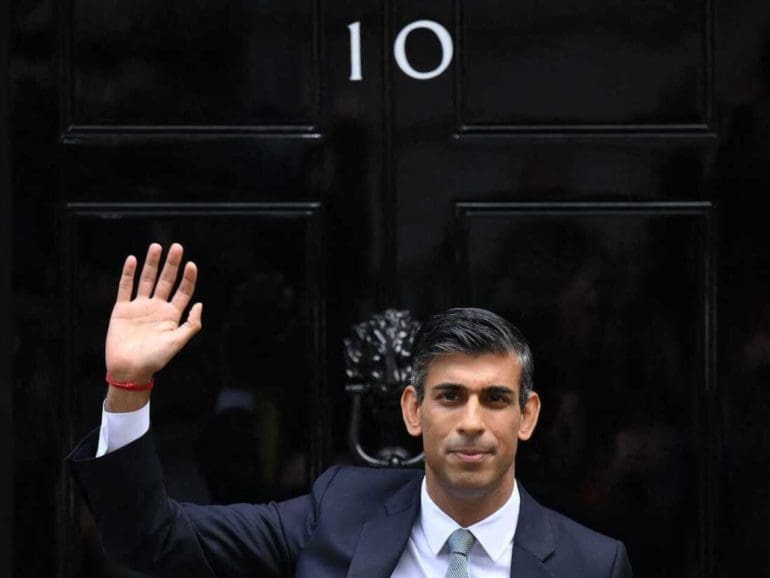Rishi Sunak became Britain’s latest prime minister on Oct. 25.
In light of his reputation as a tech-friendly conservative, many members of the fintech community have questioned whether or not this will be a good thing. As a candidate for the Conservative Party leadership and as chancellor under Boris Johnson, Sunak made his aspirations for fintech known, and in this article, we examine them further.
Related:
Rishi Sunak’s tenure
As chancellor in 2020, Sunak requested a review of the UK’s fintech sector, also known as the Kalifa Review, published in February 2021. He also supported the scale-up visa and the UK government’s plans to introduce stablecoins.
Janine Hirt, CEO of Innovate Finance, agrees, “In his time as Chancellor, Rishi Sunak was a great champion for the UK fintech community. He understood that the future of finance would be digital and set the goal of making the UK the best place in the world to start and grow a crypto business. He also commissioned the Kalifa Review of UK fintech, which Innovate Finance was pleased to serve as the co-secretariat for, and led the implementation of its core recommendations. In Rishi Sunak, we now have a Prime Minister who understands how technology will transform financial markets and products for the better and sees that smart regulation is an important part of strengthening the UK’s overall competitiveness. If this translates into a cohesive strategy, with joined-up implementation across government and regulators, and collaboration with industry, the UK will be in a prime position to lead the next wave of financial transformation.”
However, in his previous government, Sunak promised to focus on the UK’s research and development (R&D) and increase spending compared to other developed nations to aid in developing innovative technologies.
The 2020 budget promised to increase public investment in R&D to £22bn by 2024/25 and signal, at home and abroad, to ensure the UK is serious about becoming a science and technology superpower.
In August, the science and technology committee in the House of Lords and the Royal Society made criticisms by the end of his tenure as chancellor; this was not achieved.
UK’s competitive advantage
Overall, Sunak led British fintech to rapid growth during his tenure as chancellor. According to the Department of International Trade (DIT), The UK fintech sector is the top-ranking investment destination in Europe, with £3 billion in venture capital attracted in 2020. It accounts for more deals and money invested than Germany, Sweden, France, Switzerland, and the Netherlands combined and ranks second globally, only behind the U.S.
Research conducted by Mckinsey also highlights a huge variance across European fintech ecosystems. In all three critical performance areas, namely founding, funding, and scaling, the UK (and Sweden) performed significantly better than their European counterparts. Additionally, the UK ranks first in seed and series A funding per capita (series B+) for start-ups. In 2021, the UK dominated the European market with early-stage funding valued at approximately €1.3 billion and late-stage funding valued at about €8.3 billion. Compared with the US, the UK’s performance is far better than that of the US, whose GDP is about ten times larger than the UK’s, but spending on funding is only four times greater than the UK’s.
For this growth path to continue, Hirt calls on Sunak’s government to provide incentives for innovation.
“In terms of international competitiveness, UK fintech leaders want smart and intelligent regulation that enables innovation rather than deregulation. To cement the UK as the global leader in financial services, we also need to ensure we have a cohesive government strategy around digital assets, as this is the sector’s future. In addition, it is critical that we support and foster continued adoption of technology, especially in financial markets infrastructure.”
Hirt continues, “While the UK has historically been a global leader in fintech, receiving more investment than anywhere else in the world after the US, we are now at a critical juncture, and we cannot afford to rest on our laurels. For example, in the first half of 2022, Singapore overtook the UK regarding venture capital investment in crypto assets and has already established a regulatory system for a stablecoin. The UK is now playing catch up, with the current Financial Services and Markets Bill in Parliament set to give regulators the powers to introduce stablecoin regulation.”
The optimism that once permeated the UK fintech market has rapidly transformed into concerns regarding a potential recession and whether the country still has a competitive advantage. A combination of geopolitical uncertainties, turbulence in the public markets, supply chain disruptions, high inflation, and rising interest rates has led to a decline in UK fintech investments.
Sunak has made significant inroads into the fintech landscape and has supported the industry. That is good news for the ecosystem, and the UK as a whole will benefit from a tech-friendly prime minister.



